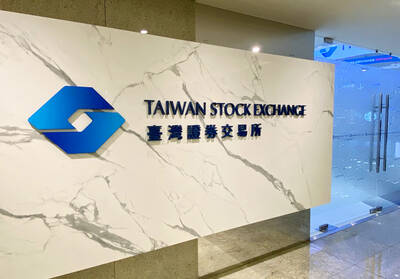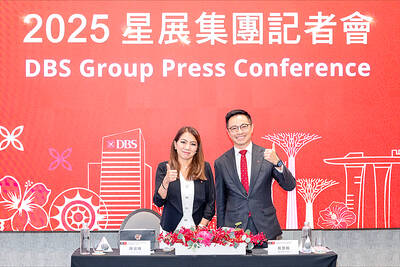Taipei Times (TT): Can you explain why ANZ decided to sell its retail and wealth management businesses in Taiwan, China, Indonesia, Singapore and Hong Kong to DBS Group Holdings Ltd?
Farhan Faruqui: We never had retail and wealth businesses in Asia with the exception of Japan. We made forays into the space after acquiring Royal Bank of Scotland’s local retail and wealth management businesses seven years ago, making us the fourth-largest corporate bank in Asia.
At that time, it made sense. Very few people knew ANZ because we were new to Asia. The deal gave us branding — with signs all over cities — and some liquidity for retail deposits among other things. The acquisition also enabled us to connect retail and wealth customers in Asia and Australia. A lot of money goes from Asia into Australia buying property, education and tourism, and more and more Australians are coming to Asia.
However, the regulatory environment has grown much more stringent in retail banking over the past seven years. We had hoped regulation would converge across different countries, but it has diverged. The cost of compliance has gone up while capital requirements for doing business have been increased. All this is happening as economic growth slows, margin in business narrows and interest rates are at all-time lows.
Meanwhile, local banking competitors have increased investment and become big players in this space. It has become evident that we can only carry on with this business if we have more scale. The cost of acquiring the scale is very high. So the alternative is either to slowly reduce the emphasis or find a buyer who would be a more natural custodian of the business and who has the interest to increase the scale.
DBS has invested in many countries in Asia. By acquiring our retail and wealth businesses, the Singaporean banking group would double its scale. That is the right strategy for DBS, because it wants to become Asia’s largest wealth management player. With the acquisition, it will be.
The transaction allows us to dispose of our business, which is not a priority anymore given the challenges in regulation and the market environment.
TT: What will ANZ’s focus be? Will it be difficult to achieve the goal without the support of retail and wealth?
Faruqui: We are not looking to become a bank that is present everywhere in the world. Instead, we want to focus on being the best bank in Asia. The transaction allows us to focus more capital and resources for institutional business, which is well-placed and will continue to grow.
From the corporate business point of view, retail is not that important. Now we have a brand, scale and a strong customer base, and have built liquidity. We have invested heavily in technology, cash management, trade products and market capability. We will continue to invest in those areas.
Our job is to make sure we provide a world-class platform and we have the ability to create an outstanding client experience for our clients. We can connect our customers across our network in a seamless fashion, giving them world-class onboarding documentation and operational capability.
We also want to make sure we invest capital with them as they grow, being their reliable partners as they become bigger themselves.
TT: How will the deal with DBS affect ANZ’s presence in Taiwan and elsewhere in the region?
Faruqui: We are not changing our presence in any country, but just [continuing] without the retail business. Currently, we have 12 operating units — 11 branches plus a head office — and employ 1,100 people in Taiwan. Most of them will transfer to DBS, some will receive other offers from the bank [ANZ] and some unfortunately will be affected. In the meantime, we will transfer more than a half-million customers to DBS.
Our decision is based purely on economic factors across Asia, not based on any individual country. We simply cannot compete without the scale in the market.
We have to do the right thing by our customers by handing them over to a bank that will continue to invest in this business and by our people who will continue to have a career. The alternative would be much worse.
We will go through details with DBS in the next few months about which branches it will take over and which branches we still need.
We are reviewing Vietnam and branches elsewhere in Asia to see what the outcome will be. Vietnam has some complexity on the regulatory level. That might eventually be a sale as well down the road.
TT: Will the changes in Taiwan’s relationship with China affect your plans in Greater China?
Faruqui: We are not going to change our strategy in Taiwan because of administration changes that keep happening. Taiwan has some world-class companies. The more opportunities companies have to grow and expand, the more we can do with them. We would love for them to have access to every market. Our job is to make sure when they do business, we are there to support them.
TT: Does ANZ have a different strategy in terms of customer selection, compared with its US and European competitors?
Faruqui: We can’t be everywhere. There is only so much world-class capability we can build. We want to focus on sectors where we have natural advantages to help, like resources, mining, energy and financial institutions. As an Australian bank, we know resources, agriculture, logistics and infrastructure well. Additionally, we have invested in sectors that will become more important in the future, such as technology and healthcare, where there are a lot of opportunities and connectivity across the region.
There are also important players in other sectors, but we probably won’t be able to bank many players in each of the sectors, because we want to focus where we can win and be selective.

Taiwan Semiconductor Manufacturing Co (TSMC, 台積電) secured a record 70.2 percent share of the global foundry business in the second quarter, up from 67.6 percent the previous quarter, and continued widening its lead over second-placed Samsung Electronics Co, TrendForce Corp (集邦科技) said on Monday. TSMC posted US$30.24 billion in sales in the April-to-June period, up 18.5 percent from the previous quarter, driven by major smartphone customers entering their ramp-up cycle and robust demand for artificial intelligence chips, laptops and PCs, which boosted wafer shipments and average selling prices, TrendForce said in a report. Samsung’s sales also grew in the second quarter, up

LIMITED IMPACT: Investor confidence was likely sustained by its relatively small exposure to the Chinese market, as only less advanced chips are made in Nanjing Taiwan Semiconductor Manufacturing Co (TSMC, 台積電) saw its stock price close steady yesterday in a sign that the loss of the validated end user (VEU) status for its Nanjing, China, fab should have a mild impact on the world’s biggest contract chipmaker financially and technologically. Media reports about the waiver loss sent TSMC down 1.29 percent during the early trading session yesterday, but the stock soon regained strength and ended at NT$1,160, unchanged from Tuesday. Investors’ confidence in TSMC was likely built on its relatively small exposure to the Chinese market, as Chinese customers contributed about 9 percent to TSMC’s revenue last

Taiwan and Japan will kick off a series of cross border listings of exchange-traded funds (ETFs) this month, a milestone for the internationalization of the local ETF market, the Taiwan Stock Exchange (TWSE) said Wednesday. In a statement, the TWSE said the cross border ETF listings between Taiwan and Japan are expected to boost the local capital market’s visibility internationally and serve as a key for Taiwan becoming an asset management hub in the region. An ETF, a pooled investment security that is traded like an individual stock, can be tracked from the price of a single stock to a large and

Despite global geopolitical uncertainties and macroeconomic volatility, DBS Bank Taiwan (星展台灣) yesterday reported that its first-half revenue rose 10 percent year-on-year to a record NT$16.5 billion (US$537.8 million), while net profit surged 65 percent to an unprecedented NT$4.4 billion. The nation’s largest foreign bank made the announcement on the second anniversary of its integration with Citibank Taiwan Ltd’s (花旗台灣) consumer banking business. “Taiwan is a key market for DBS. Over the years, we have consistently demonstrated our commitment to deepening our presence in Taiwan, not only via continued investment to support franchise growth, but also through a series of bolt-on acquisitions,” DBS